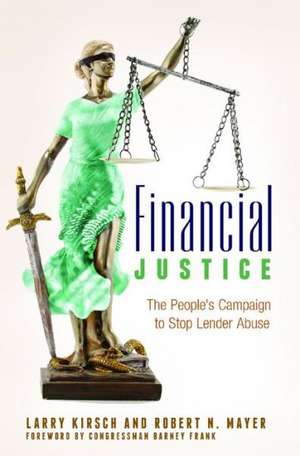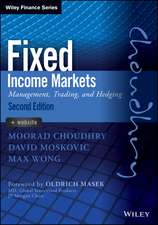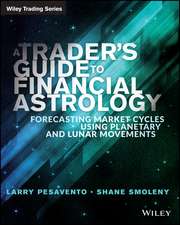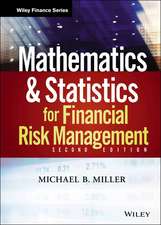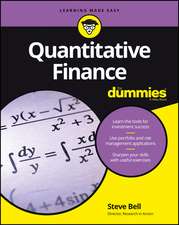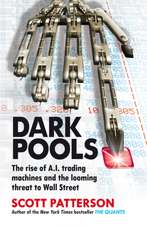Financial Justice: The People's Campaign to Stop Lender Abuse
Autor Larry Kirsch Cuvânt înainte de Barney Frank Autor Robert N. Mayeren Limba Engleză Hardback – 8 mai 2013 – vârsta până la 17 ani
Preț: 362.16 lei
Preț vechi: 391.91 lei
-8% Nou
Puncte Express: 543
Preț estimativ în valută:
69.31€ • 72.09$ • 57.22£
69.31€ • 72.09$ • 57.22£
Carte disponibilă
Livrare economică 22 martie-05 aprilie
Preluare comenzi: 021 569.72.76
Specificații
ISBN-13: 9781440829512
ISBN-10: 1440829519
Pagini: 256
Ilustrații: 15
Dimensiuni: 156 x 235 x 33 mm
Greutate: 0.82 kg
Editura: Bloomsbury Publishing
Colecția Praeger
Locul publicării:New York, United States
ISBN-10: 1440829519
Pagini: 256
Ilustrații: 15
Dimensiuni: 156 x 235 x 33 mm
Greutate: 0.82 kg
Editura: Bloomsbury Publishing
Colecția Praeger
Locul publicării:New York, United States
Notă biografică
Larry Kirsch is an economist and managing partner of IMR Health Economics.Robert N. Mayer, PhD, is professor in the Department of Family and Consumer Studies at the University of Utah.
Cuprins
Foreword by Congressman Barney FrankAcknowledgmentsIntroduction1. How Did We Ever Get into This Mess?2. Elizabeth Warren Has a Notion3. The Magic Moment for Reform4. Activists Need Leaders, Too5. Coalescing the Coalition6. The Battle in the House7. Wanted: A Few Votes in the Senate8. Auto Dealers Drive for an Exemption9. Preemption: The Role of State Reformers10. What Did the Advocates Accomplish and How?Afterword: Backward and Forward with Elizabeth WarrenNorman I. SilberNotesSelected BibliographyIndex
Recenzii
Financial Justice portrays a lively, in-depth narrative of the people waging the battle for consumer finance protection and their victories, setbacks, and compromises. It brings to life the legislative history of the Act that created the Consumer Finance Protection Bureau (CFPB) by illustrating the work of activists, policy advocates, and policymakers involved in the creation of the CFPB. . . . With all its attention to detail, this book is a valuable asset to anyone researching the history of the Dodd-Frank Act and the CFPB.
The book, based on solid research and interviews with Elizabeth Warren and campaign advocates, has fascinating chapters dealing with the legislative struggles showing how the activists held wavering members of Congress accountable for key votes, while addressing the larger issue of how social movements can contribute to progressive political change.
A very readable account of the creation of the Consumer Financial Protection Bureau . . . authors do an excellent job of describing the congressional maneuvering on both sides in both houses, as well as the work of the activists and business interests in shaping the final outcome. Very informative . . . highly recommended.
While the future of the CFPB is uncertain, Kirsch and Mayer's book provides a good guide to how the agency came to be despite the odds stacked against it.
The authors should be commended for their recognition of the need for an empirical study here and for the skill and thoroughness they employed in getting the job done during an especially contentious time for the US Congress.
The book, based on solid research and interviews with Elizabeth Warren and campaign advocates, has fascinating chapters dealing with the legislative struggles showing how the activists held wavering members of Congress accountable for key votes, while addressing the larger issue of how social movements can contribute to progressive political change.
A very readable account of the creation of the Consumer Financial Protection Bureau . . . authors do an excellent job of describing the congressional maneuvering on both sides in both houses, as well as the work of the activists and business interests in shaping the final outcome. Very informative . . . highly recommended.
While the future of the CFPB is uncertain, Kirsch and Mayer's book provides a good guide to how the agency came to be despite the odds stacked against it.
The authors should be commended for their recognition of the need for an empirical study here and for the skill and thoroughness they employed in getting the job done during an especially contentious time for the US Congress.
